By Amy Tenbrink (@amytenbrink)
It’s not a secret that my brain doesn’t know what to do with science fiction novels. Despite my many, many friends who dive happily into the science fiction universe—seemingly, any science fiction universe—science fiction leaves me perplexed, confused, and often frustrated. (It’s not you, science fiction; it’s me.) I try, over and over again, to figure out what it is about science fiction, but the best explanation I have is that it’s just not my thing. (Neither, for the record, is navel-gazing literary fiction.) So, please, don’t ask me about whatever the latest and greatest science fiction book is; I haven’t read it.
But I keep trying. Every year, I read a handful of science fiction books, some that sound interesting, some that are zeitgeist books, some that do something interesting with gender, and some because my science fiction-loving best friend made me. And some of them are good.
Because my friends have been terrific enough to hand me science fiction books that cross over into fantasy, knowing that I’m going to be a much happier reader if a sword or a mage or some wings show up once in a while, I am passing on the favor. Here are five amazing science fiction/fantasy works that I loved. I hope you love them, too.
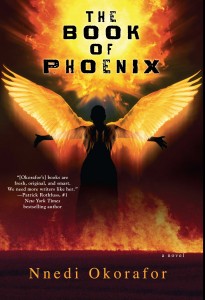 |
1. The Book of Phoenix, Nnedi Okorafor When someone asks me about science fiction, I can’t say “Nnedi Okorafor” fast enough. Nnedi sometimes writes complex, raw, angry women, and I have to tell you, as an angry woman, that angry female characters are still one of those writing taboos. As if angry women aren’t a thing—except wait, we’re not supposed to be, are we? The Book of Phoenix, Nnedi’s latest, is a prequel to Who Fears Death (and if you haven’t read Who Fears Death, can I help you with that?). It tells the story of Phoenix, a two-year-old experiment in a forty-year-old woman’s body, who starts a revolution. In a world where magic and science have merged, and are continuing to merge, not always deliberately and not always in ways that anyone can control, The Book of Phoenix examines what it means to be free—from mutilation, from a cell, from fear, from government control. And the epilogue just kills. |
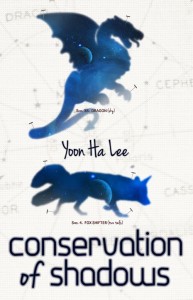 |
2. Conservation of Shadows, Yoon Ha Lee I have friends who are my book friends—meaning that we tend to like the same books—but most of my friends aren’t my book friends at all. But I have smart friends, so when a friend who rarely recommends books thinks I should add a book to the bookstore at Sirens, I do—and then I sell it out based on her recommendation and have to go buy my own copy after the fact. That book was Conservation of Shadows. Conservation of Shadows is a collection of short stories, most of them about female protagonists, most of them about war, all of them stunning examples of the form. Yoon once gave an interview to Clarke’s World discussing, among other things, the short story form and how a short story author must assassinate the reader; you don’t have time for elaborate maneuvers or large-scale war. And I have to tell you, Conservation of Shadows is, yes, a series of masterful assassinations, but it’s also a dazzling amalgamation of math and music, origami and war, duty and honor. |
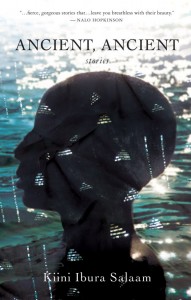 |
3. Ancient, Ancient, Kiini Ibura Salaam Of all the questions I ask—usually aloud—while reading books, perhaps the one I ask most often is: “Why is there no sex in this book?” I grew up in a time when there wasn’t a ton of young adult work (or at least it wasn’t marketed as such), which means I went straight from the Nancy Drew Files to my mom’s romances. This thing where all these young adult romance books don’t have sex scenes is perpetually confusing to my brain because in pretty much all other respects (except, I suppose, the clothes), these are my mom’s romances! But beyond that, there aren’t really many fantasy books with steamy sex. And then I met Ancient, Ancient. People, Ancient, Ancient is about sex. It’s about finding your sex drive and the value of the energy emitted during sex and cheating on your partner with a goddess and deciding not to decide what you want in a society that doesn’t give you many options. It’s graphic, it’s steamy, and it’s thoughtful and smart and genre-bending and amazingly discomfiting. We read so many books where sex happens in vagueness or off the page; we should celebrate a book where sex and female pleasure are right up in your face. (P.S. The story “Rosamojo” is about rape, so you may want to skip that one.) |
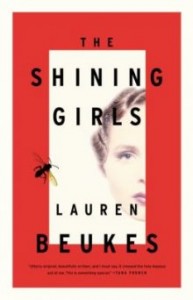 |
4. The Shining Girls, Lauren Beukes I circled Lauren Beukes’s work for years before finally picking up The Shining Girls. Years. Because I had this idea, which isn’t even really true, that she was a science fiction writer. So I made someone else read her, and even when the verdict on Zoo City was “holy crap, amazing,” I still didn’t. Until The Shining Girls. Why The Shining Girls? Because I grew up on a steady diet of crime thrillers, and if you had to classify The Shining Girls, you’d probably classify it as a crime thriller. But it’s so much more than that. The Shining Girls is a time travel book about a serial killer who preys on women. He finds a house in Chicago with the power to spit him out in any time, and he uses that to commit the nearly perfect crime. “Nearly perfect” because The Shining Girls isn’t really about some jerk serial killer; it’s really about an amazing woman, left for dead by our killer, who tracks him down through time. This book masterfully juggles its time threads—so masterfully that, even though your first instinct upon completing this book is to start again so you can double-check the author’s work, you don’t because you know she got it right. |
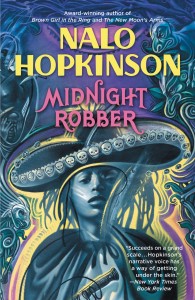 |
5. Midnight Robber, Nalo Hopkinson When Sirens tackled retold tales a few years ago, Midnight Robber was my poster-child of the theme. Retold tales wasn’t just about Cinderella reimagined as Elle, queen of the prom, or Romeo and Juliet mashed up with the Trojan War, or even Götterdämmerung retold with the littlest Valkyrie. It’s rawer than that, about reclaiming women’s stories and women’s place as storytellers. It’s powerful, uncompromising, and diverse. In certain Caribbean cultures, the Midnight Robber is a popular costume for Carnival. The Midnight Robber wears an extravagant costume, including a fringed hat and cape, and uses distinctive speech patterns. The Midnight Robber is, traditionally, a man. But not in Nalo’s version. Midnight Robber, set in a future Caribbean where alternate-dimension travel is possible and the Granny Nanny internet is omnipresent, seven-year-old Tan-Tan’s life falls apart. When her father commits a crime, he flees to an alternate universe, taking Tan-Tan with him. Midnight Robber is a bildungsroman, and we watch as Tan-Tan becomes the Midnight Robber, thereby finding herself and claiming her power. If you ever wanted a book about women asserting their rights as storytellers, this is that book. |







Connect with the Sirens community
Sign up for the Sirens newsletter